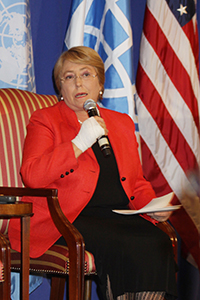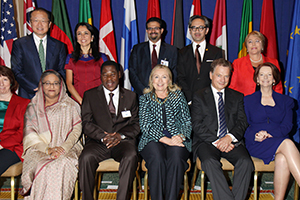Remarks of Michelle Bachelet at the launch of the ‘Equal Futures Partnership’ initiative
Date:
Remarks of Michelle Bachelet United Nations Under-Secretary-General and Executive Director of UN Women at the launch of the ‘Equal Futures Partnership'. New York, 24 September 2012.
[ Check against delivery ]
Excellencies,
Distinguished Delegates and colleagues,
I congratulate and thank the United States Government and President Barack Obama and Secretary of State Hillary Clinton and their teams for launching the Equal Futures Partnership. I also want to thank Secretary of State Hillary Clinton for her strong leadership for women and gender equality. And to Jim Kim, thank for you the clear commitment of the World Bank to gender equality and women's empowerment.
We know that leadership is about bringing people together for a vision we believe in.
The vision we believe in is dignity, justice and human rights for all.
UN Women is a strong partner of the Equal Futures Partnership. We will mobilize others, call for change and push for equal rights, equal opportunities and equal participation.

We do have success. We now have global recognition that solving the world's most pressing problems requires the full and equal participation of women. We can no longer afford to hold back half of the world's population. We are here to match this recognition with strong commitment and action.
I applaud and thank all the Governments and partners that announced commitments today. They are Australia, Bangladesh, Benin, Denmark, Finland, Indonesia, Jordan, Peru, Senegal, Tunisia and the United States, along with the European Union.
I encourage other governments to join in this partnership.
UN Women will work with the Equal Futures Partnership in the areas of economic and political empowerment and ending violence against women. We will provide technical advice and support knowledge and capacity development, facilitate and share best practices, and support implementation of commitments at country level.
We will use our knowledge networks to disseminate experience coming from the Equal Futures Partnership, to benefit all those working for gender equality and women's empowerment worldwide.
One year ago during the General Assembly, leaders signed a declaration to increase women's political participation as fundamental to democracy, peace and sustainable development. Today one year later, we are making progress. From Algeria to Libya to Senegal, more women serve as representatives in their national parliaments. The number of countries reaching the 30 per cent mark of women in parliament has risen from 27 to 33, and 30 of these countries achieved this through temporary special measures such as quotas.
Countries have increased women's political participation by passing laws and reforming constitutions, building coalitions, training women leaders, and supporting women's movements and women voters.
Political participation goes hand in hand with economic empowerment. Removing barriers and unleashing women's potential raises economic growth and makes economic recovery faster, fairer and more sustainable. Countries are making progress by instituting policies and passing laws to end discrimination and advance decent work for women, promoting women's leadership on corporate boards and worker's organizations, and promoting a culture of equality and shared responsibility between women and men at work and in the household.

Progress is accelerated when strong efforts are taken to end violence against women and girls. A comprehensive approach involves preventing violence from happening in the first place by promoting gender equality, ending impunity and increasing women's access to justice, and providing survivors of violence with essential health, legal and social services.
All over the world, we are making progress but we still have a long way to go to achieve real equality. Today I call on all countries to take urgent and strong measures to protect the human rights of women and girls. I pledge the continued and full support of UN Women to gender equality and women's empowerment.